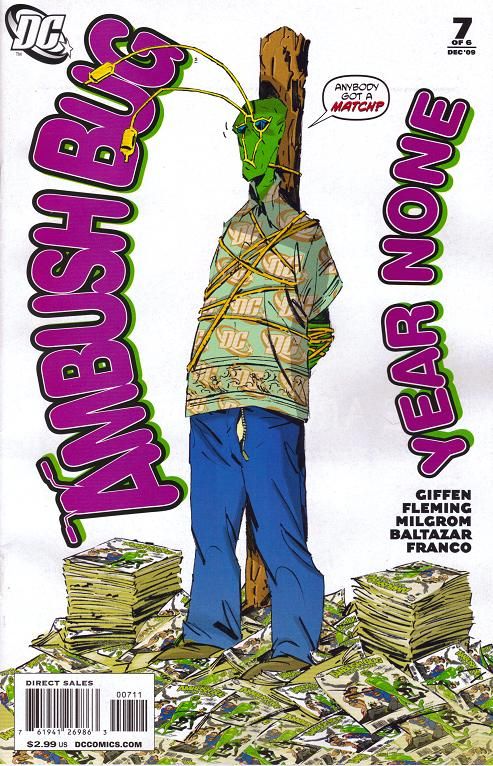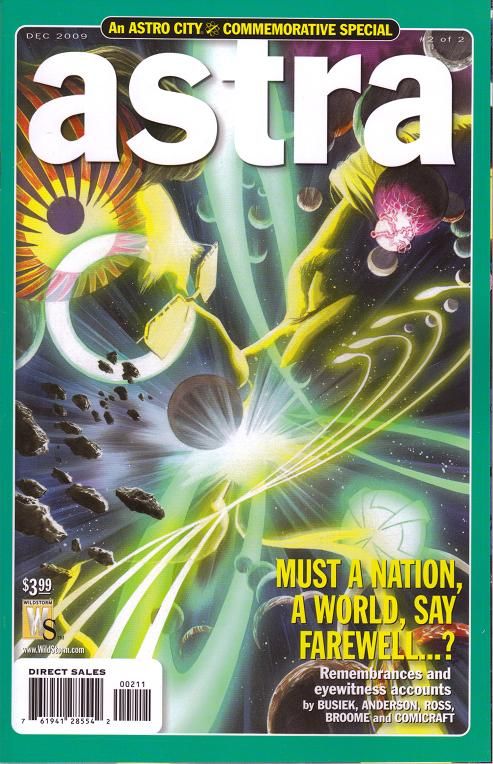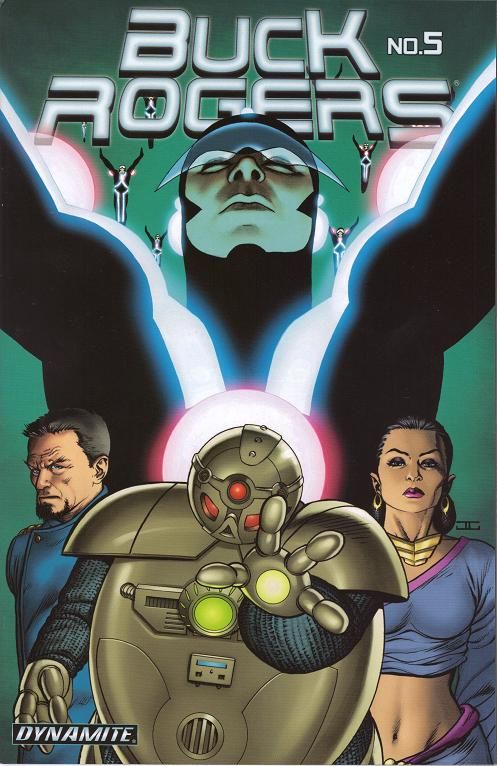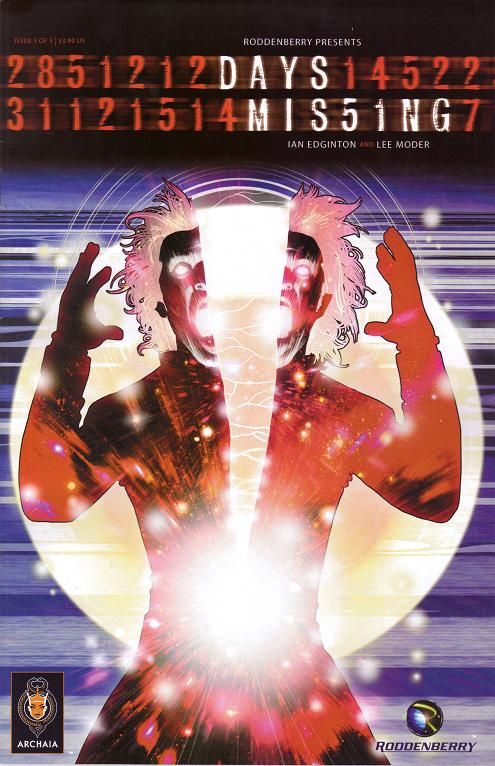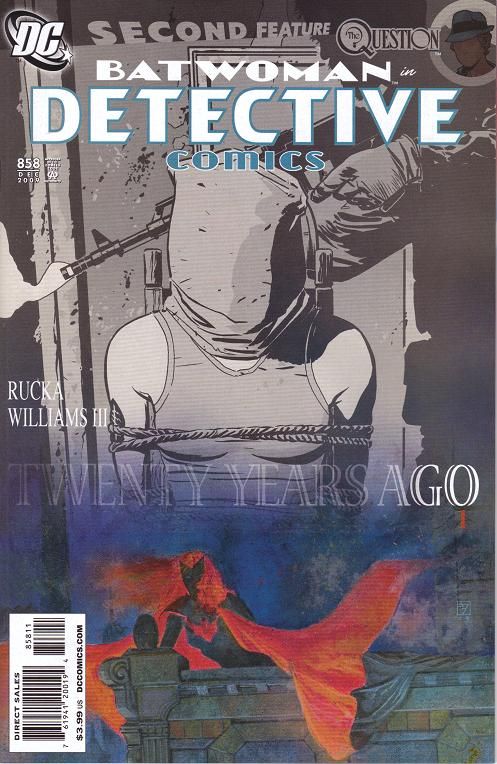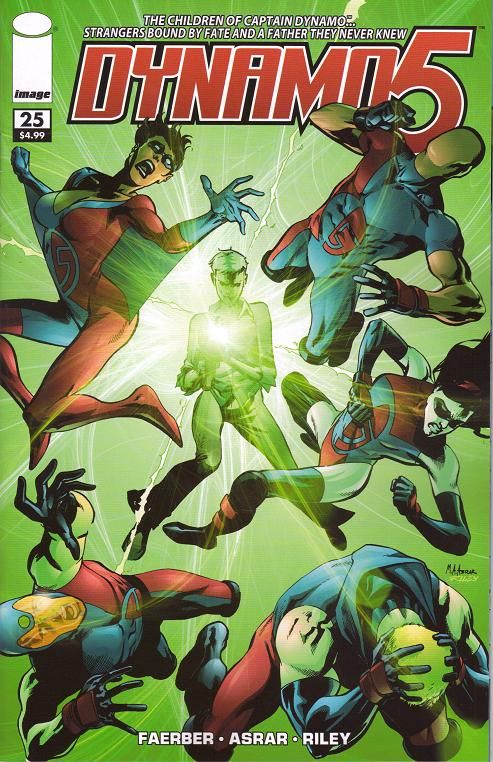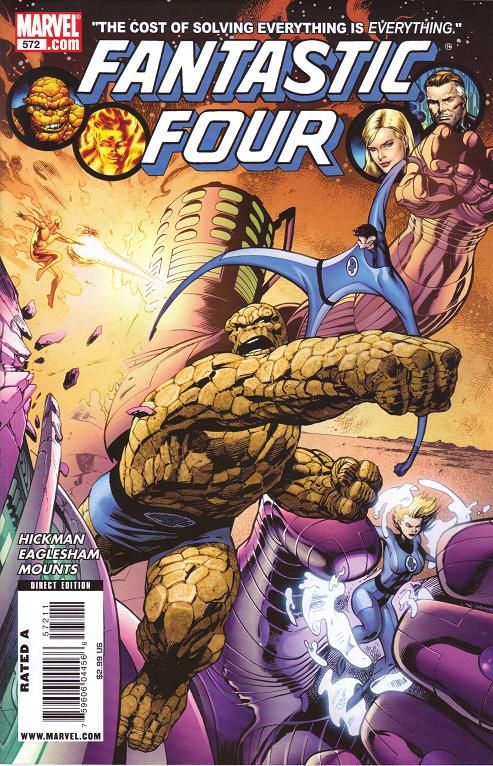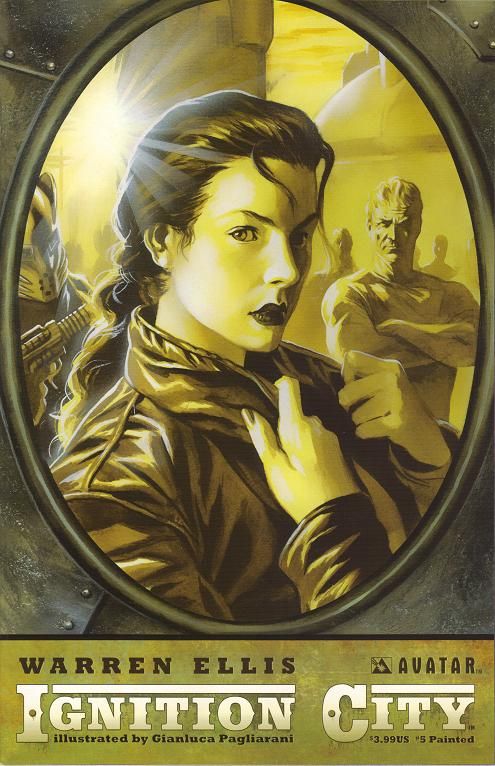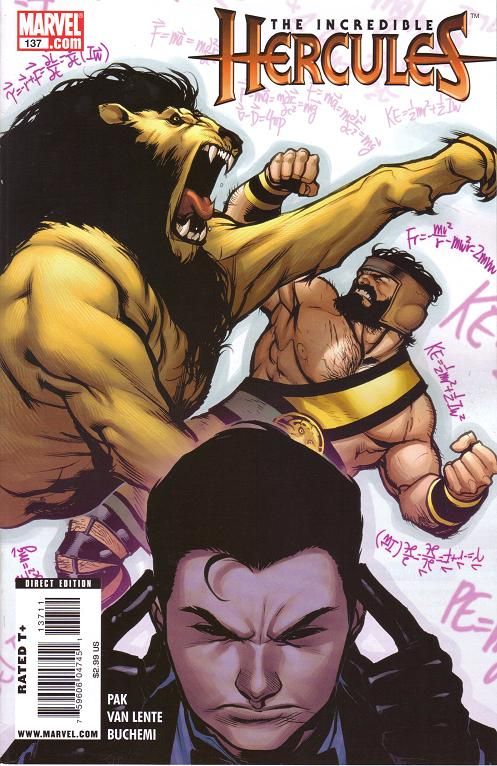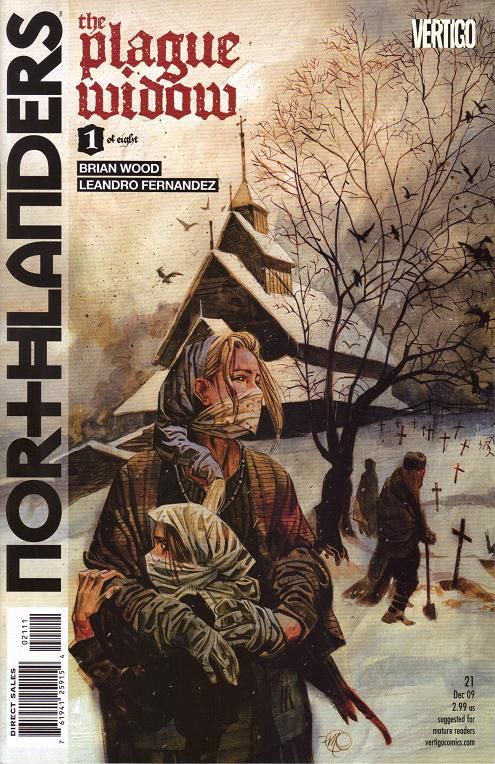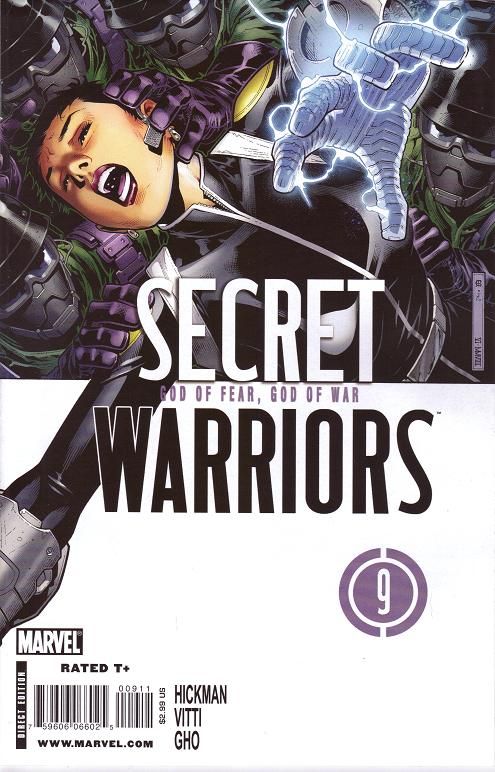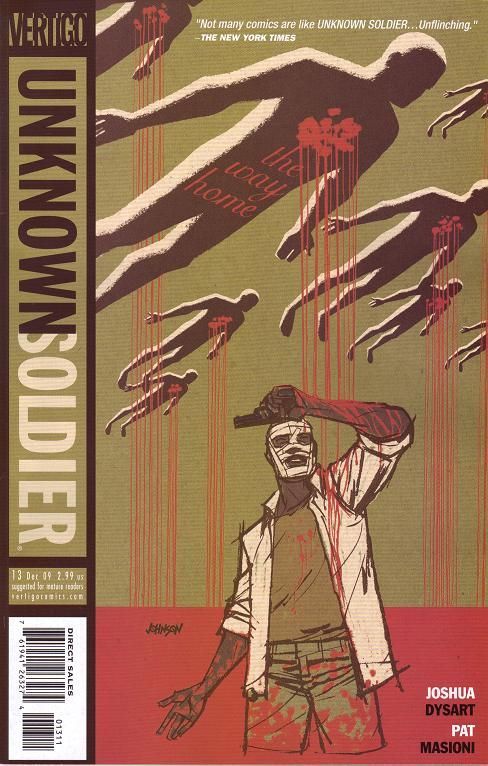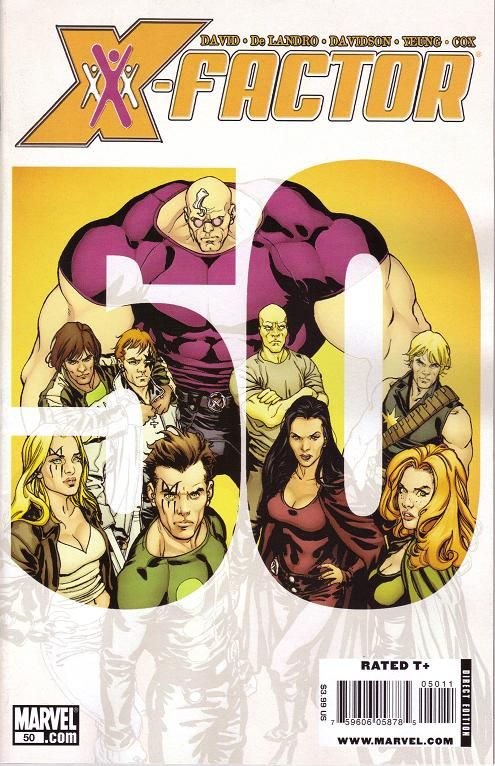You can just forward my mail to me in Hell, okay?
Ambush Bug #7 (of 6) ("One Year Late") by Keith Giffen (plotter/penciller), Robert Loren Fleming (writer), Art Baltazar (artist), Franco Aureliani (artist), Al Milgrom (inker), Pat Brosseau (letterer), and Guy Major (colorist). $2.99, 21 pgs, FC, DC.
Meh. It's a fun issue, as a reporter tries to figure out what the heck happened to issue #6 and Ambush Bug, but the fact that issue #6 actually existed but never saw the light of day seems like much more of an interesting story, but I guess we'll never learn what happened. It's fairly bizarre, and it gets back to the real insularity of the comics industry. I mean, we often hear about why movies don't get made - they may be bullshit reasons, but we often hear them - but in comics, books just disappear and we never learn why. There was obviously some reason DC pulped issue #6, but I doubt if we'll ever learn what it is. That's kind of disappointing.
Astro City Special: Astra #2 (of 2) ("The Gordian Knot") by Kurt Busiek (writer), Brent E. Anderson (artist), J. G. Roshell (letterer), Jimmy Betancourt (letterer), and Wendy Broome (colorist). $3.99, 24 pgs, FC, DC/Wildstorm.
This is kind of a strange issue, as Busiek channels his inner Warren Ellis or Alan Moore and gives us an issue of Astra simply wandering around with her boyfriend explaining things. It allows Anderson to show off a lot, and he's certainly up to the cosmic splendor that Busiek wants from him, but it's a weird issue, because we rarely get this kind of thing from Busiek. It's not bad, and Busiek always does a nice job with the throwaway concepts in Astro City, but it's also tough to care too much about Astra's problem, because she's way out on the other end of the universe and she's not dealing with a big threat or anything, just her future. The great thing about Astro City is always that Busiek keeps everything grounded, but in this issue, Matt isn't a strong enough personality to keep things from getting overwhelming. I don't mind the occasional misstep in this series, however, because it's a fun issue to look at, and in the grand scheme of things, it's always cool to check in on old characters. And that's a pretty cool cover, I must say.
Buck Rogers #5 ("Future Shock Part Five: The Caloric Standard") by Scott Beatty (writer), Carlos Rafael (artist), Carlos Lopez (colorist), and Simon Bowland (letterer). $3.50, 22 pgs, FC, Dynamite Entertainment.
The ending of the first arc is a bit anti-climactic, which is weird. It looks great, as Rafael gives us some nice space action as the humans battle the Pack, but it feels like Buck and his allies are simply going through their paces, and that there's no chance of defeat, which makes this a bit less exciting than it could be. There's a brief showdown with the mastermind, but it's over quickly and with little fuss. Even Ardala's scheme doesn't pan out terribly well. I understand that this initial arc was more about getting Buck introduced to the 25th century, but there could have been a bit more excitement to the bigger plot. Strange.
Days Missing #3 (of 5) ("September 19th, 2008") by Ian Edginton (writer), Lee Moder (artist), Imaginary Friends Studios (colorist), Troy Peteri (letterer). $3.99, 22 pgs, FC, Archaia/Roddenberry.
Edginton's contribution to this series deals with what happens when a person begins to figure out what the Steward is doing to time, and whether he will step in to stop that person from finding out his secrets. Of course the answer is yes, but Edginton does a nice job with how the drama plays out - the Steward tries to convince the physicist, Kate Prosper, that it would be better for all concerned if she stops her investigations on her own. He throws in a man whose son is dying of leukemia and who decides to destroy the Large Hadron Collider because he thinks it's a waste of money - money that could have gone to help his son. This becomes two nice love stories, as both Kate and Alain Maurais, the father, realize what's important in their lives.
Edginton is a good writer, and Moder, although drawing in a style I don't like as much as his older stuff, is a fine draughtsman. This continues to be an interesting, thought-provoking series, no matter which creators are working on it!
Detective Comics #858 ("Twenty Years Ago"/"Pipeline Chapter One Part Five") by Greg Rucka (writer), J. H. Williams III (artist, "Twenty Years Later"), Dave Stewart (colorist, "Twenty Years Later"), Todd Klein (letterer, "Twenty Years Later"), Cully Hamner (artist, "Pipeline"), Dave McCaig (colorist, "Pipeline"), and Jared K. Fletcher (letterer, "Pipeline"). $3.99, 30 pgs, FC, DC.
I'm still buying this for the art, because Rucka just isn't bringing his "A" game to this book. It's not that the stories have been lousy, but they've been kind of boring and predictable, and in this issue, we get Kate's "origin," which means people are going to get shot in the head. Williams is dynamite as usual, changing his style in the sequences when Kate is a kid to such a degree that it looks like a different artist - it's very John Paul Leon. It still looks wonderful, and the few pages set in the present offer a glorious contrast to the rest of the book. It's a shame he's not getting a better effort from Rucka. And I really like Rucka. But he's just painting by numbers on this book.
Dynamo 5 #25 by Jay Faerber (writer), Mahmud Asrar (artist), Ron Riley (colorist), Charles Pritchett (letterer). "Eye of the Beholder" by Andie Tong (penciler), Kris Justice (inker), James Offredi (colorist); "Strong Enough" by Joe Eisma (artist) and Paul Little (colorist); "Just Another Pretty Face" by Tim Seeley (artist) and Kieran Oats (colorist); "Sky High" by Fran Bueno (artist); "Mixed Blessing" by Anthony Castrillo (artist) and Paul Little (colorist). $4.99, 46 pgs, FC, Image.
This is Asrar's last issue as artist on Dynamo 5, which sucks. Asrar is a great superhero artist, and it's disappointing that he's going off to Marvel to toil in anonymity for a while until he gets his own comic. He drew Thunderbolts #137, and while it's not bad art, I fear he'll get lost in the shuffle for a time while he toils away. I'm glad he got the attention of the big guys, but this is the way things work - the artist has to wait to get a big book, and in the meantime, he wanders around without a home. I wish him well, but I'm still depressed that creators can't make a living on indy books like this.
So the book is going on hiatus while the new artist (Faerber isn't saying who it is) gets some issues under his (her?) belt, and it's a good place for a break. The Dynamo 5 kids defeat the bad guys and switch powers thanks to a weapon the bad guy used on them. So the back-up stories are about the kids learning a bit more about their powers and introducing their new code names. It's a typically exciting issue, and it will be interesting to see where Faerber goes with it. I do hope the book returns when he says it will - I already miss Noble Causes (speaking of which, Yildiray Cinar draws the latest issue of Teen Titans, in another example of a good artist without a home at the Big Two) and I don't want this to go away. It will be nice to see it back.
Hey, Marvel - give Asrar a book I want to read! Would that be so hard?
Fantastic Four #572 "Solve Everything Conclusion") by Jonathan Hickman (writer), Dale Eaglesham (artist), Paul Mounts (artist), and Rus Wooton (letterer). $2.99, 22 pgs, FC, Marvel.
Hickman ends his first arc on the title kind of oddly, as basically these three issues were to show that Reed's not a dick. Well, we kind of already knew that, so I'm not sure what the point of this was. It's a pretty exciting story, and Eaglesham is marvelous on it, but it seems kind of pointless. It's not even that Reed realizes the cost of solving everything (as the cover proclaims, it's "everything") and makes the choice to reject the council. A member of the council tells him that he will give up everything to solve all the world's problems, and Reed says he won't. It's an odd way to get at the central tenet of the arc - another Reed lays it out for our Reed, and our Reed walks away. We don't really get a sense that our Reed was struggling with this at all. Shouldn't the choice have been more difficult for him?
Plus, Sue's speech to Reed when he's getting weapons together to fight the Celestials rubbed me the wrong way. She apologizes for what she said earlier, but she says it's not because she was wrong, but because she forgets what it's like to be Reed. Then she absolves him of being a dick and says she'll just wait for him. I don't know why it bugged me - probably because whenever I read a Fantastic Four comic (which, admittedly, isn't often), it seems like Sue's usually the one apologizing, and even when Reed does, he never seems to learn anything. Why is it that traumatic events are the only ones that seem to remind Reed that he has a family? Why does he take them for granted so much? I know it's "part of his character," but Sue is always making compromises for him, and he never seems to do so for her. This simpering Sue who stands outside Reed's lab and tells him she'll be waiting for him when he remembers he has a family bothers me. But that could be just me.
Anyway, although this wasn't the greatest arc, it's intriguing enough that I'm willing to stick around and see where Hickman is going with the book. I'm a tad disappointed Eaglesham could only do three issues and now needs a break, but that's the way it is, I guess.
Ignition City #5 (of 5) by Warren Ellis (writer), Gianluca Pagliarani (artist), Chris Dreier (inker), and Digikore Studios (colorist). $3.99, 22 pgs, FC, Avatar.
Ignition City finally concludes with the BIG SECRET coming out, and as far as secrets go, it's not bad. Ellis links the story to the true story of the Nazi scientists after World War II, which allows him to express some indignation about the way the real world works. Of course, this is an adventure comic, so we can ignore realpolitik and engage in some revenge fantasies, and so Mary gets a small measure of vengeance for her father's death.
There's a lot going on here, as usual for Ellis, and he pulls it off quite well. There's a tremendous sense of sadness in this book, because of the idea that mankind could reach the stars but doesn't, something Ellis seems to fret about quite often. This is also a bit of a western, as the inhabitants of Ignition City were promised brand new worlds but then the frontier closed and they don't know what to do with themselves. It's a nifty mini-series, drawn very well by Pagliarani, and I encourage you to check out the trade when it shows up. It's less horrifying than Ellis's Avatar superhero stuff, but it's definitely a bit more thoughtful.
The Incredible Hercules #137 ("Atonement") by Fred van Lente (writer), Greg Pak (writer), Rodney Buchemi (artist), Guillem Mari (colorist), and Simon Bowland (letterer). $2.99, 22 pgs, FC, Marvel.
As usual with the recent issues focusing on Amadeus rather than Hercules, this is a bit less insane, but no less good. Pak and van Lente explain a lot about what's been going on, and it leads back to why Amadeus needs to find Hercules again. It's really nicely done, and shows how tightly plotted this book has been for 25 issues or so. And it's always nice to see someone outthinking the bad guy, as Amadeus does here.
I don't really have a lot to say about this comic. It's consistently entertaining and probably the best book Marvel publishes right now. But you already knew that!
Northlanders #21 ("The Plague Widow Part 1 of 8: Seven Hundred on the Volga") by Brian Wood (writer), Leandro Fernandez (artist), Dave McCaig (colorist), and Travis Lanham (letterer). $2.99, 22 pgs, FC, DC/Vertigo.
Wood begins another long-term arc on this excellent comic, as a plague comes to a Viking settlement on the Volga river in 1020 and the inhabitants must figure out what to do. A priest, Boris, claims that the plague is spread by little organisms jumping from human to human (of course we know today that disease is spread when one is insufficiently patriotic), which makes a lot of the people angry. (Germ theory was in its infancy in the eleventh century, but Boris could have heard of it from the Arabs, who were futzing around with it at this time.) Meanwhile, Hilda, the plague widow of the title, loses her husband and decides to trust Boris when he calls for the infected people to be kicked out of the village. This leads to an unpleasant scene as the infected turn on each other.
Fernandez does an excellent job on the art, bringing the stark winter of Russia to chilly life. It's a harshly beautiful comic to look at, and Fernandez is also quite adept at showing the terror on the faces of the characters as they make horrible choices.
As usual, this is a very good comic. I always look forward to it!
Secret Warriors #9 by Jonathan Hickman (writer), Alessandro Vitti (artist), Sunny Gho (colorist), and Dave Lanphear (letterer). $2.99, 22 pgs, FC, Marvel.
It's a big fight issue, with a bit of intrigue thrown in. Mostly it's Fury's Heroes fighting Osborn's Avengers, and Hickman does a good job showing that Fury's gang is a bit outclassed but are still able to hold their own. There's a really cool scene where Bullseye gets beaten up but enjoys it, and generally, Vitti does a good job with a lot of action. Then John Garrett has a confrontation with the Secretary of the Treasury, who turns out to be not very nice. It's somewhat annoying because that story is continued in Dark Reign: The List - Secret Warriors, which means I have to go buy it. Damn it, Marvel! (It came out three weeks ago, too, which is just ... well, moronic. Good move, Marvel.)
I'm still not jazzed by Fury's Heroes, but they're growing on me. We'll see how Hickman wraps this thing up next issue, as Ares looks for revenge!
Unknown Soldier #13 ("The Way Home Chapter One of Two") by Joshua Dysart (writer), Patrice Masioni (artist), José Villarrubia (colorist), and Clem Robins (letterer). $2.99, 23 pgs, FC, DC/Vertigo.
This is a bit weaker an issue of Unknown Soldier, mainly because Dysart reverts to a completely polemical story, which ironically weakens his point. This is part one of two, so he sets up the story of a young boy trying to get back to his family and enlisting Moses to take him. Of course, the boy - Paul - has been recruited as a soldier in the guerrilla army, so he tells Moses about it as they travel, and it's typically horrifying. But it's so obviously horrible that it reads more like a press clipping, one we read, feel bad about, and then move on. Paul isn't real to us, and that blunts the horror he's gone through. Dysart has been quite good at making this book an action adventure that happens to take place in Uganda, and that has made the horrors of the war more real, but this issue doesn't really do that as well. It's notable for the presence of Masioni, a Congolese artist living in France. Dysart writes about trying to find an artist from the area to be a fill-in artist for when Ponticelli needed a break, and they found Masioni in France. Masioni writes about his life in the back of the book, and it's an affecting read. His art isn't great, but the fact that he has intimate knowledge of what's going on in central Africa helps make Paul's story a bit more powerful than it is from the script. It's what makes this an interesting comic even when the actual issue isn't as strong as the previous ones. We'll see how Dysart finishes this sucker next issue.
X-Factor #50 by Peter David (writer), Valentine de Landro (penciler), Pat Davidson (inker), Craig Yeung (inker), Jeromy Cox (colorist), and Cory Petit (letterer). $3.99, 32 pgs, FC, Marvel.
David wraps up his big storyline, and it's actually quite keen. I know that some reviewers have been frustrated with his sprawling tale, but I love that he does stuff like this. He takes a long view with regard to his titles, and while it's a bit annoying reading them in monthly installments (even though David is good enough to make the monthly installments fun to read), it's very nice to read them all at once, and this is no exception. David pulls everything together, explains Layla Miller's penchant for "knowing stuff" that fits in perfectly, explains the deal with Trevor Fitzroy (not that anyone was clamoring for it, but there it is), and while he tells and doesn't show what happens in the climax, it's still a nifty ending to the big epic. The art continues to be simply okay, but it's perfectly serviceable. It's always nice to read a story that sprawls over several issues and brings in so much from the history of these characters.
So next issue is issue #200, which makes not a lot of sense, but whatever. I don't know how long David plans on writing the book, but I'll keep reading as long as he's writing!
Well, that's the week. I apologize again for the lousiness of these reviews. I'm feeling much better but I'm still kind of in a funk. I just want to sit around and do nothing, which is driving my wife nuts, I'll tell you that much. I ought to be cleaning up the house, but I'm just sitting around watching The Mummy: Tomb of the Dragon Emperor and other shit movies (and yes, it's a shit movie, but it features Michelle Yeoh, so it's not completely worthless). Maybe next week I won't be in such a funk. Who knows? Until then, let's fire up some totally random lyrics!
"I just wanna live the life I please
I don't want no enemies
I don't want nothin' if I have to fake it
Never take nothin don't belong to me
Everything's paid for, nothing's free
If I give my heart will you promise not to break it?"
Have a great weekend, everyone! Enjoy that 70-degree weather! (Isn't it 70 degrees everywhere? It's 70 here in the AZ. Yes, the weather is finally getting nice!)


